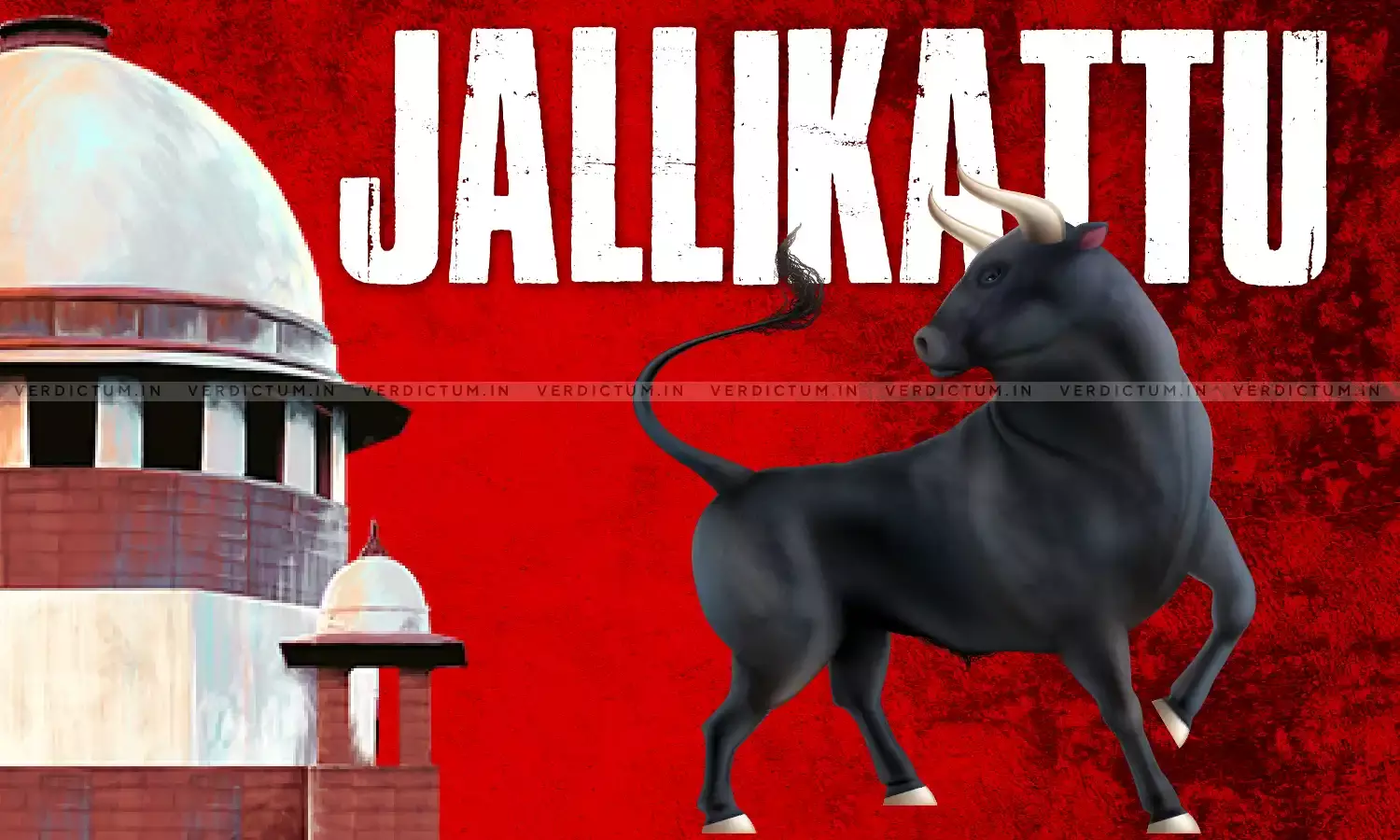Supreme Court Upholds 'Jallikattu': Holds That Tamil Nadu Amendment Act Is In Compliance With Constitutional Principles

The Supreme Court in its judgment in a batch of pleas challenging the practice of Jalikattu, Kambala and other bull-cart racing as a cultural sport upheld the validity of the Tamil Nadu Amendment Acts allowing the sport. The Constitution bench further held that to decide upon what constitutes a part of the cultural and traditional heritage does not require a judicial enquiry, instead, it is to be determined by the house of people.
In the operative part of the judgment, the bench held:
-The Tamil Nadu amendment act is not a piece of colourable legislation which relates in pith and substance to Entry 17, List III of the Seventh Schedule to the Constitution of India. It imparts cruelty to animals in the concerned sport and once the Amendment Act, along with the rules and regulations the aforesaid sports will not come under the The Prevention of Cruelty to Animals Act, 1960.
"Jallikattu is a bovine sport and we are satisfied that it is going for at least last few centuries. It essentially involves a bull set free in an arena, where participants are to grab the hump to score in the gang. But whether it has become integral part of the Tamil culture or not requires religious, cultural and social analogies in greater detail which can not be undertaken by the judiciary".
-Since legislative exercise has already been undertaken and Jallkattu has been found as a part of the cultural heritage of Tamil Nadu, we don't want to disrupt this view of the Legislature.
-Disagreed with the judgment in the matter of A Nagaraja holding that performance of Jallikattu is not a part of the cultural heritage of the State. We do not see sufficient material before the Court to come to that conclusion. In the Preamble to the Tamil Nadu State Act, Jallikattu has been recognised as a part of culture. In that case, the Court found that the cultural heritage is unsubstantiated and concluded that such activities attract the provision of the 1960 Act.
-Legislature is the suited branch of the state to determine the matter.
-If a traditional or cultural activity violates a law, the penal consequences would follow.
-The Tamil Nadu Act does not go contrary to Article 51 A(g) and (h) of the Constitution and does not violate Articles 14 and 21 of the Constitution.
-Defects made out in the two judgment has been overcome by the State amendment, by the rules made in that behalf.
The Constitution bench of Justice K.M. Joseph, Justice Ajay Rastogi, Justice Aniruddha Bose, Justice Hrishikesh Roy and Justice C.T. Ravikumar pronounced the judgment. The unanimous judgment was pronounced by Justice Bose.
On December 8, 2022, the bench had reserved its judgment.
During Pongal festival, in Tamil Nadu, Jallikattu is a popular native bull taming sport, where participating people attempt to grab the animal, while the bull tries to escape from the clutches. As per the State, it is a cultural sport.
The sport was banned by the Supreme Court in May 2014, in Animal Welfare Board of India v A. Nagaraja, and in 2015 it had dismissed the State's review plea.
Pursuant to this, the State government passed the Prevention of Cruelty to Animals (Tamil Nadu Amendment) Act in January 2017 permitting the sport. Subsequently, PETA along with other organizations challenged the practice for allegedly being cruel to the animal involved in the sport.
A bench of Justice Dipak Mishra and Justice Rohintan Nariman in February 2, 2018, referred the batch of writ petitions to a 5-Judge Constitution Bench.
The pertinent questions that were to be determined were:
i. Is the Tamil Nadu Amendment Act referable, in pith and substance, to Entry 17, List III of the Seventh Schedule to the Constitution of India, or does it further and perpetuate cruelty to animals; and can it, therefore, be said to be a measure of prevention of cruelty to animals? Is it colourable legislation which does not relate to any Entry in the State List or Entry 17 of the Concurrent List
ii. The Tamil Nadu Amendment Act states that it is to preserve the cultural heritage of the State of Tamil Nadu. Can the impugned Tamil Nadu Amendment Act be stated to be part of the cultural heritage of the people of the State of Tamil Nadu so as to receive the protection of Article 29 of the Constitution of India?
iii. Is the Tamil Nadu Amendment Act, in pith and substance, to ensure the survival and well-being of the native breed of bulls? Is the Act, in pith and substance, relatable to Article 48 of the Constitution of India?
iv. Does the Tamil Nadu Amendment Act go contrary to Articles 51A(g) and 51A(h), and could it be said, therefore, to be unreasonable and violative of Articles 14 and 21 of the Constitution of India?
v. Is the impugned Tamil Nadu Amendment Act directly contrary to the judgment in A. Nagaraja (supra), and the review judgment dated 16th November, 2016 in the aforesaid case, and whether the defects pointed out in the aforesaid two judgments could be said to have been overcome by the Tamil Nadu Legislature by enacting the impugned Tamil Nadu Amendment Act?
All the writ petitions in the matter stand dismissed. Other pending applications if any are also disposed of.
Cause Title: Animal Welfare Board Of India And Ors. v Union Of India

